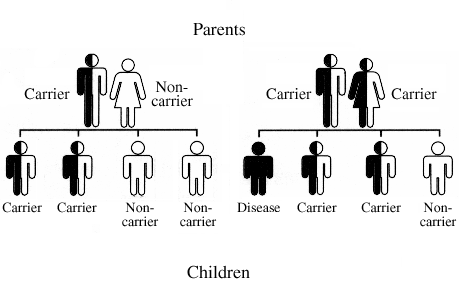What are autosomal recessive diseases?
Autosomal recessive diseases are genetic diseases that are passed to a child through both parents' chromosomes.
Each person inherits 23 chromosomes from each parent and so has 23 pairs of chromosomes. Each chromosome contains genes. One or both of the chromosomes in a pair may contain an changed (mutated) gene that could cause a genetic disease. In an autosomal recessive disease, both chromosomes in a pair must have a changed gene for the person to have the disease. If only one chromosome has a changed gene, the person is a carrier and does not have symptoms.
If both parents carry the gene change, there is a:
- 25% chance in each pregnancy that their child will inherit the changed gene from each parent (two genes) and have the disease.
- 50% chance in each pregnancy that their child will receive one changed gene and be a carrier.
- 25% chance in each pregnancy that their child will not receive the changed gene and be neither a carrier nor have the disease.
If only one parent carries the gene change, there is a 50% chance in each pregnancy that the child will:
- Receive the changed gene and be a carrier.
- Not receive the changed gene and be neither a carrier nor have the disease.
If neither parent carries the gene change, the child will not have this type of disease.
Autosomal recessive diseases include Tay-Sachs disease, cystic fibrosis, sickle cell disease, autosomal recessive polycystic kidney disease (ARPKD), and phenylketonuria (PKU).
Carrier Test for Autosomal Recessive Conditions

Autosomal recessive conditions are genetic diseases that are passed to a child through both parents' chromosomes. Autosomal recessive diseases include Tay-Sachs disease, cystic fibrosis, sickle cell disease, autosomal recessive polycystic kidney disease (ARPKD), and phenylketonuria (PKU).
Each person inherits 23 chromosomes from each parent and so has 23 pairs of chromosomes. Each chromosome contains genes. One or both of the genes in a pair can carry a mutation and fail to function properly. In an autosomal recessive condition, both chromosomes in a pair must have a mutation for the person to have the disease. If only one gene carries a mutation, the person is a carrier of the condition but does not have any symptoms.
One parent is a carrier | Both parents are carriers |
|---|---|
| If only one parent carries a mutation, there is:
| If both parents carry a mutation, there is:
|
©2011-2025 Healthwise, Incorporated
